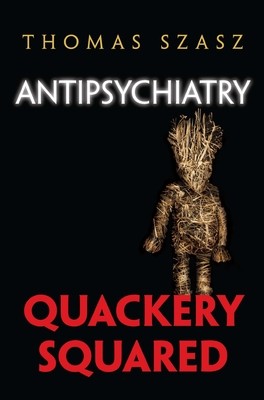
- We will send in 10–14 business days.
- Author: Thomas Szasz
- Publisher: Syracuse University Press
- Pages: 208
- ISBN-10: 0815609434
- ISBN-13: 9780815609438
- Format: 16.1 x 23.5 x 2 cm, kieti viršeliai
- Language: English
- SAVE -10% with code: EXTRA
Reviews
Description
More than fifty years ago, Thomas Szasz showed that the concept of mental illness--a disease of the mind--is an oxymoron, a metaphor, a myth. Disease, in the medical sense, affects only the body. He also demonstrated that civil commitment and the insanity defense, the paradigmatic practices of psychiatry, are incompatible with the political values of personal responsibility and individual liberty. The psychiatric establishment's rejection of Szasz's critique posed no danger to his work: its defense of coercions and excuses as therapy supported his argument regarding the metaphorical nature of mental illness and the transparent immorality of brutal psychiatric control masquerading as humane medical care.
In the late 1960s, the launching of the so-called antipsychiatry movement vitiated Szasz's effort to present a precisely formulated conceptual and political critique of the medical identity of psychiatry. Led by the Scottish psychiatrist R. D. Laing, the antipsychiatrists used the term to attract attention to themselves and to deflect attention from what they did, which included coercions and excuses based on psychiatric principles and power. For this reason, Szasz rejected, and continues to reject, psychiatry and antipsychiatry with equal vigor. Subsuming his work under the rubric of antipsychiatry betrays and negates it just as surely and effectively as subsuming it under the rubric of psychiatry. In Antipsychiatry: Quackery Squared, Szasz powerfully argues that his writings belong to neither psychiatry nor antipsychiatry. They stem from conceptual analysis, social-political criticism, and common sense.EXTRA 10 % discount with code: EXTRA
The promotion ends in 23d.16:24:38
The discount code is valid when purchasing from 10 €. Discounts do not stack.
- Author: Thomas Szasz
- Publisher: Syracuse University Press
- Pages: 208
- ISBN-10: 0815609434
- ISBN-13: 9780815609438
- Format: 16.1 x 23.5 x 2 cm, kieti viršeliai
- Language: English English
More than fifty years ago, Thomas Szasz showed that the concept of mental illness--a disease of the mind--is an oxymoron, a metaphor, a myth. Disease, in the medical sense, affects only the body. He also demonstrated that civil commitment and the insanity defense, the paradigmatic practices of psychiatry, are incompatible with the political values of personal responsibility and individual liberty. The psychiatric establishment's rejection of Szasz's critique posed no danger to his work: its defense of coercions and excuses as therapy supported his argument regarding the metaphorical nature of mental illness and the transparent immorality of brutal psychiatric control masquerading as humane medical care.
In the late 1960s, the launching of the so-called antipsychiatry movement vitiated Szasz's effort to present a precisely formulated conceptual and political critique of the medical identity of psychiatry. Led by the Scottish psychiatrist R. D. Laing, the antipsychiatrists used the term to attract attention to themselves and to deflect attention from what they did, which included coercions and excuses based on psychiatric principles and power. For this reason, Szasz rejected, and continues to reject, psychiatry and antipsychiatry with equal vigor. Subsuming his work under the rubric of antipsychiatry betrays and negates it just as surely and effectively as subsuming it under the rubric of psychiatry. In Antipsychiatry: Quackery Squared, Szasz powerfully argues that his writings belong to neither psychiatry nor antipsychiatry. They stem from conceptual analysis, social-political criticism, and common sense.

Reviews